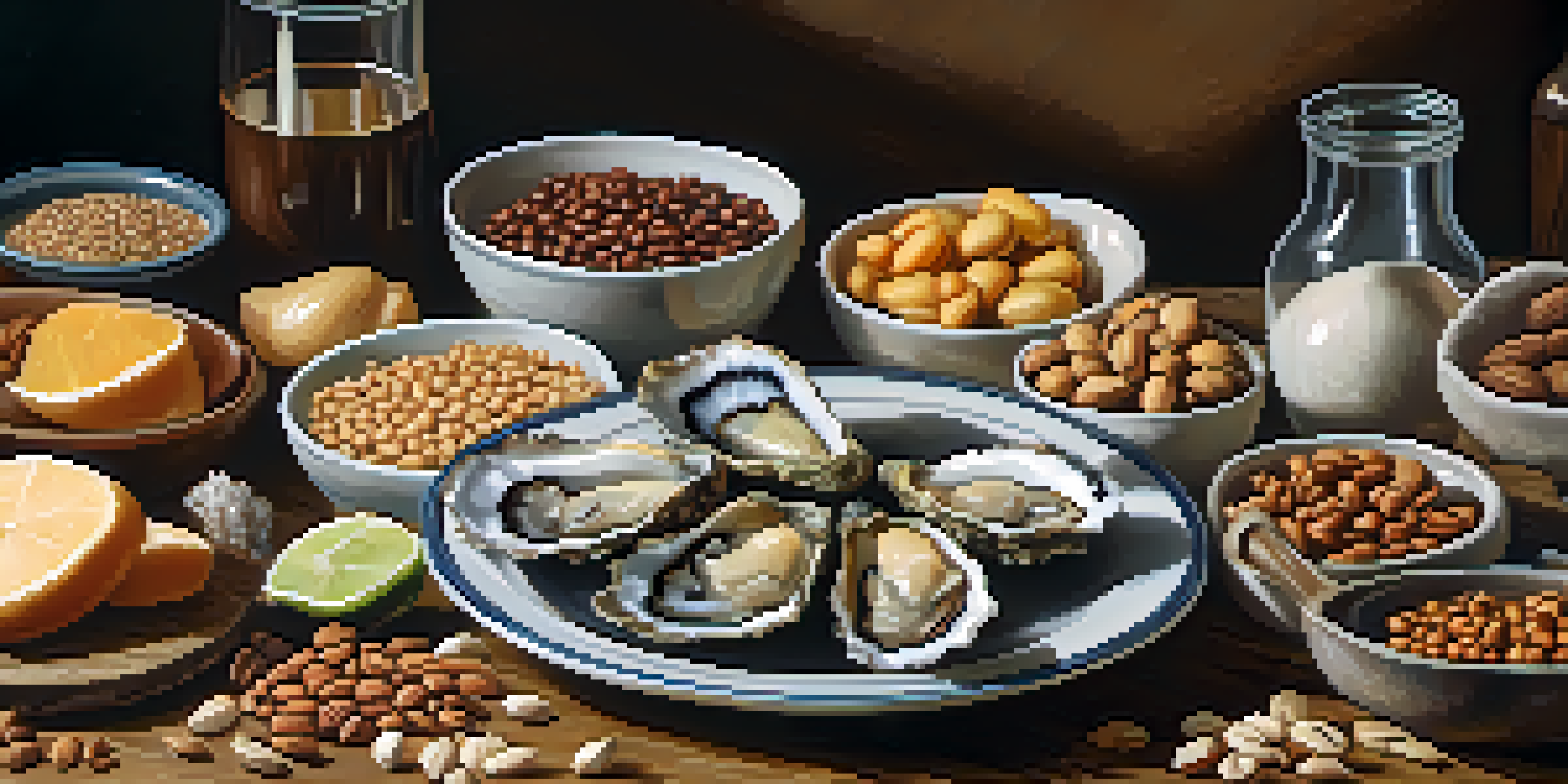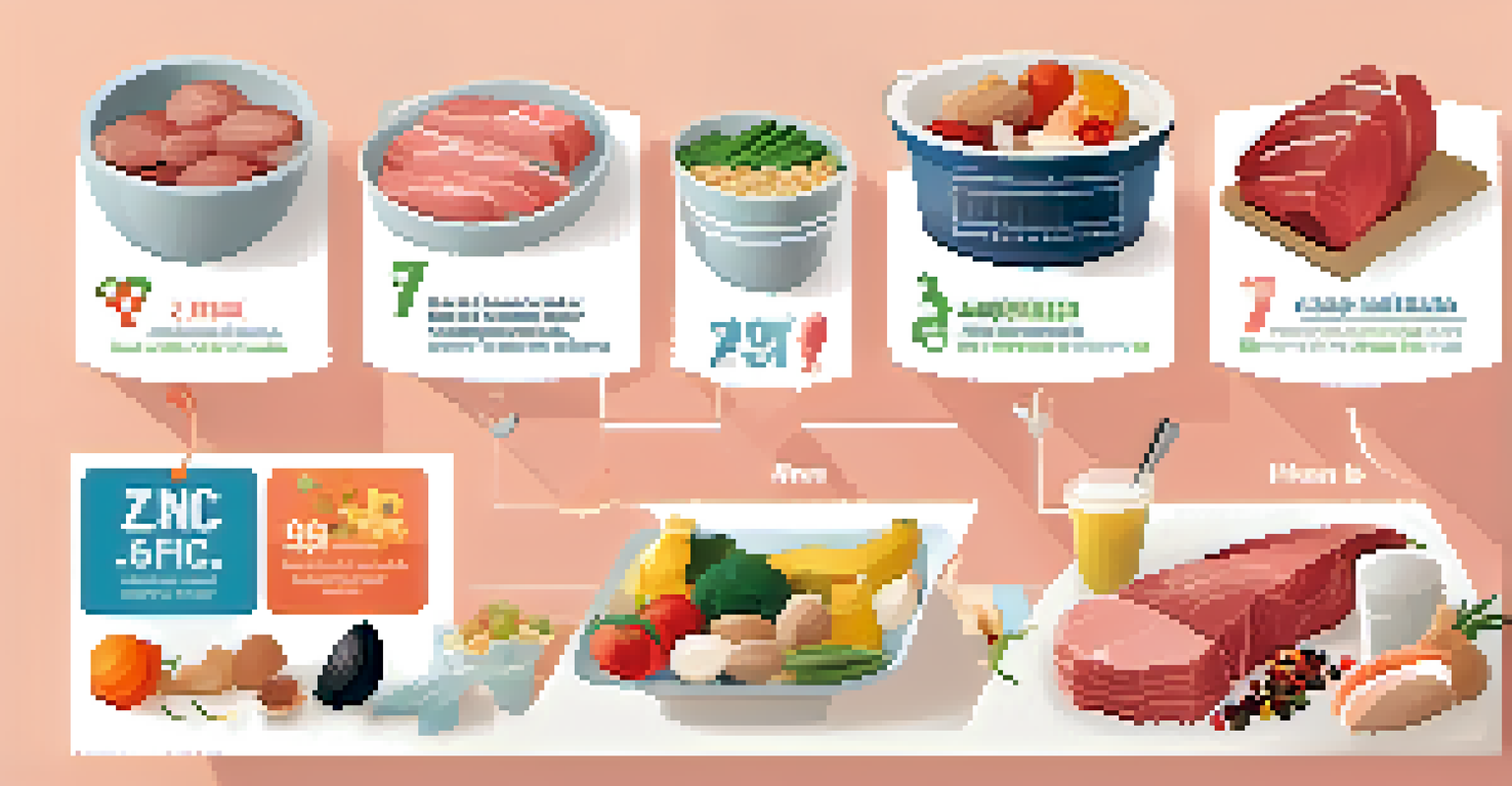Understanding the Role of Zinc in Your Diet

What is Zinc and Why is it Important?
Zinc is a trace mineral that's essential for our body's functioning. Even though we only need it in small amounts, its role is significant. It helps in numerous bodily processes, including immune function, protein synthesis, and wound healing.
Zinc is a vital trace element that plays a crucial role in maintaining a healthy immune system and performing multiple functions in the body.
This mineral is also crucial for our sense of taste and smell. Think of zinc as the unsung hero of your body – it may not get as much spotlight as vitamins, but it quietly supports various vital functions.
Without adequate zinc, you might experience symptoms like weakened immunity or slow healing, which can significantly affect your overall well-being.
How Much Zinc Do You Need?
The recommended dietary allowance (RDA) for zinc varies by age and gender. For adult men, it's about 11 mg per day, while adult women need around 8 mg. Pregnant and breastfeeding women require even more to support their health and their baby's growth.

It's important to remember that these values can differ based on individual needs and dietary habits. Consulting with a healthcare provider can help you determine the right intake for you.
Zinc is Essential for Health
Zinc plays a crucial role in immune function, wound healing, and overall bodily processes.
If you’re not getting enough zinc, you might feel fatigued or notice a decline in your ability to taste food, which can be quite frustrating!
Zinc Sources: Where Can You Find It?
Zinc is found in a variety of foods, making it relatively easy to include in your diet. Rich sources include meats, shellfish, legumes, seeds, nuts, dairy, and whole grains. For instance, a serving of oysters can provide you with more than enough zinc for the day!
Zinc is essential for skin health and wound healing, making it an important nutrient for anyone recovering from injuries.
If you're vegetarian or vegan, legumes, nuts, and whole grains are excellent alternatives, although they may not provide zinc as readily as animal sources. Pairing these foods with vitamin C-rich items can enhance zinc absorption.
Incorporating a diverse range of foods can help ensure you meet your zinc needs while also enjoying a well-rounded diet.
Signs of Zinc Deficiency to Watch For
Zinc deficiency can manifest in various ways, and being aware of the signs is crucial. Common symptoms include weakened immunity, hair loss, and delayed wound healing. If you notice these issues, it might be time to reassess your diet.
Additionally, you may experience changes in taste or smell, which can affect your appetite and enjoyment of food. Think of how disappointing it is to enjoy a meal but not fully appreciate its flavors!
Know Your Zinc Requirements
The recommended daily intake of zinc varies by age and gender, with adult men needing about 11 mg and women 8 mg.
If you suspect a deficiency, consulting a healthcare provider can help you explore dietary changes or supplements that can improve your zinc levels.
Zinc’s Role in Immune Function
One of zinc's most notable roles is in supporting the immune system. It helps in the development and function of immune cells, allowing your body to fend off infections more effectively. Imagine zinc as the bodyguard for your immune cells, ensuring they are ready to protect you.
Research suggests that adequate zinc levels can reduce the duration of colds and respiratory infections. So, if you want to boost your defenses, consider making zinc-rich foods a staple in your meals.
While zinc is not a cure-all, it certainly plays a vital role in maintaining a robust immune response.
Zinc and Wound Healing: The Connection
Zinc is often referred to as a wound healer. It helps maintain skin integrity and structure, which is crucial for recovering from cuts, scrapes, and surgical wounds. Think of it as the repair crew for your body, fixing up any damage that occurs.
Some studies have shown that zinc supplementation can speed up the healing process, particularly in those with zinc deficiency. This makes it an important nutrient for athletes or anyone prone to injuries.
Balance is Key with Zinc Intake
While zinc is vital, excessive intake can lead to negative side effects, so it's best to obtain it from food sources.
If you're healing from a wound, ensuring you have adequate zinc can support your recovery and prevent complications.
Potential Risks of Excess Zinc Intake
While zinc is essential, too much of it can lead to adverse effects. Excessive zinc intake can cause nausea, diarrhea, and headaches, which are definitely not the side effects you want to experience!
Long-term high doses of zinc may interfere with the absorption of other essential minerals, such as copper. This imbalance can lead to additional health issues, so moderation is key.

To avoid these risks, it's best to get zinc primarily from food sources rather than supplements unless advised by a healthcare professional.